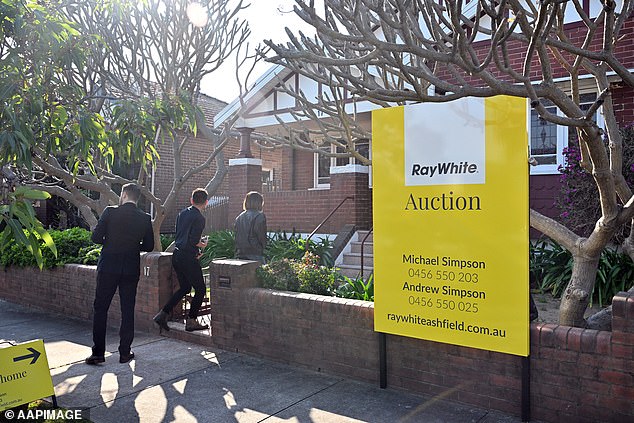Financial markets are now widely expecting a May interest rate cut as Donald Trump’s new tariffs hit Australia’s economy.
The 30-day interbank futures market is now regarding a May 20 rate cut from the Reserve Bank of Australia as an 85 per cent chance.
A further cut would see the cash rate fall to 3.85 per cent for the first time since June 2023.
Prime Minister Anthony Albanese has confirmed Australia would not retaliate to the 10 per cent tariffs imposed by the US on Australian exports, on top of the 25 per cent import duties on steel and aluminium.
‘A reciprocal tariff would be zero, not 10 per cent,’ he said.
Some have forecast the American tariffs could push up inflation, while central bankers are concerned about global trade wars slowing economic growth.
This would especially be the case in Australia, where the economy is heavily reliant on mining and agricultural exports plus low-cost imports of goods.
Reserve Bank of Australia Governor Michele Bullock made this point on Tuesday, as the RBA left rates on hold at 4.1 per cent.

Financial markets are now widely expecting a May interest rate cut as a result of Donald Trump ‘s widespread tariffs
‘We do know what to be worried about,’ she told reporters in Sydney.
‘A trade war with escalating tariffs and reciprocal tariffs is going to slow down the growth in world trade and Australia as a small, open economy has benefited massively from open trade.
‘So, it’s not good for us, a world trading system that is fragmenting, that’s not good for us.’
The imposition of tariffs could weaken the Australian dollar significantly, which would thereby make all imported goods more expensive, fuelling inflation and making the RBA reticent to reduce rates.
However AMP chief economist Shane Oliver said so long as the tariffs did not weaken the Australian dollar too badly, then rate cuts were more likely to stop a severe economic slowdown.
‘Assuming that Australia does not retaliate and the $A does not crash then Trump’s tariffs pose more of a threat to growth than causing higher inflation here and so add to the case for more RBA rate cuts,’ he said.
The local share market reacted badly to the tariffs announcement, with the benchmark S&P/ASX200 plunging by 1.99 per cent in the opening half-hour of trade on Thursday morning, although that had moderated to 1.6 per cent approaching noon.
The Australian Agricultural Company, Australia’s largest integrated beef producer, did even worse with its share price plummeting by 3.18 per cent to $1.37.
Dr Oliver said the Australian share market was likely to fall further as the US tariffs risked sparking an American recession.

The 30-day interbank futures market is now regarding a May 20 rate cut from the Reserve Bank of Australia as an 85 per cent chance after Donald Trump announced broad 20 per cent tariffs on Australia
‘Given the even bigger threat to global growth it looks like share markets will have a further leg down,’ he said.
‘Our assessment remains that shares will have a 15 per cent-plus correction measured from this year’s high.
‘A 10 per cent fall in US shares was not enough to put pressure on Trump but a 15 per cent plus fall likely will at some point resulting in some moderation in the tariffs and refocus on the market positive aspects of his agenda, like tax cuts and de-regulation.’
The Trump Administration said its tariffs were only retaliatory toward countries with their own protectionist measures, but the American government has issues with so-called ‘non-tariff barriers’.
During trade negotiations, the US had flagged its issues with Australia’s ban on American beef imports on biosecurity grounds, and the Pharmaceutical Benefits Scheme which prevents US drug companies from selling here at high wholesale prices.
It also regards the GST in Australia as protectionist even though the consumption tax is applied equally to locally-produced and imported goods and services.
More specific tariffs on other Australian exports like pharmaceuticals could be coming.
The futures market sees three more rate cuts by the end of 2025, which would see the RBA cash rate fall to 3.35 per cent for the first time since March 2023.




